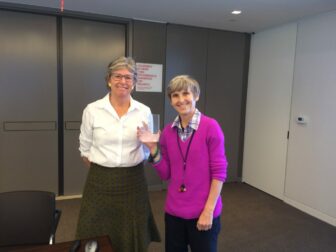Sparkplug Award, 2016 Recipient: Elizabeth M. Berry-Kravis
Table of Contents

Elizabeth M. Berry-Kravis, MD, PhD, is a Professor of Pediatrics, Neurology, and Biochemistry at Rush University Medical Center in Chicago She has a Bachelor’s degree in chemistry from the University of Notre Dame, a PhD in biochemistry and MD from the University of Chicago. She has been at Rush University Medical Center since 1992.
Dr. Berry-Kravis established the comprehensive Fragile X Clinic and Research Program at Rush in 1992, through which she provides care and support to over 400 patients with Fragile X syndrome (FXS) for management of neurological, medical, and behavioral and genetic issues. Her clinical research projects involve studies of epilepsy and psychopharmacology in Fragile X, clinical trials of new promising medications in FXS and development of outcome measures and biomarkers for such trials in the FXS population. She is also involved in research to characterize neurological problems in Fragile X-associated tremor/ataxia syndrome (FXTAS) and relate clinical and radiological findings to molecular measures in Fragile X carriers. Her laboratory research involves studies of effects of Fragile X mental retardation protein (FMRP) on signal transduction mechanisms in neural cells as well as molecular studies aimed at identifying genetic risks and genotype-phenotype relationships in neurological disorders, including Alzheimer’s disease, Parkinson’s disease, vascular dementia, congenital central hypoventilation syndrome, and SIDS.
At Rush and other Chicago institutions, Liz lectures in biochemistry, pathology, genetics, neurobiology and genetic counseling courses. She co-directs the Molecular Diagnostics Laboratory at Rush, which runs molecular tests for diagnosis of numerous genetic conditions including Fragile X syndrome. She is on the advisory board for both the FRAXA Research Foundation and the National Fragile X Foundation and received the Jarrett Cole Award for clinical work with individuals with Fragile X in 2002 and The Hagerman Award for FXTAS research in 2004.
